Inside Ward 9B: The nurses caring for our sickest kids
A nurse speaks lovingly to a pale baby girl wrapped in her arms as she carries her to the hospital morgue. ‘You were so brave, your mummy and daddy love you very much’, she tells her. We take you inside Ward 9B at the Queensland Children’s Hospital to meet the nurses who care for our sickest babies.
QWeekend
Don't miss out on the headlines from QWeekend. Followed categories will be added to My News.
NATASHA Zajaz spoke lovingly to the pale baby girl wrapped up in her arms as she carried her to the hospital morgue.
“You were so brave and your mummy and daddy love you very much,” she told the 8-month-old.
As the paediatric nurse followed a security guard and a wardsman through the Queensland Children’s Hospital’s passageways, she hummed the song ‘You are my Sunshine’ to the infant, dressed in a special outfit chosen by her parents, her eyes closed.
Four years later, Natasha, 36, is sitting on the lounge in her Algester unit, recalling the three times she has taken a baby on their final journey.
‘HIS INTESTINE WAS COILED LIKE YOU PEEL AN APPLE’
THE TUBE KEEPING THIS TINY BATTLER ALIVE
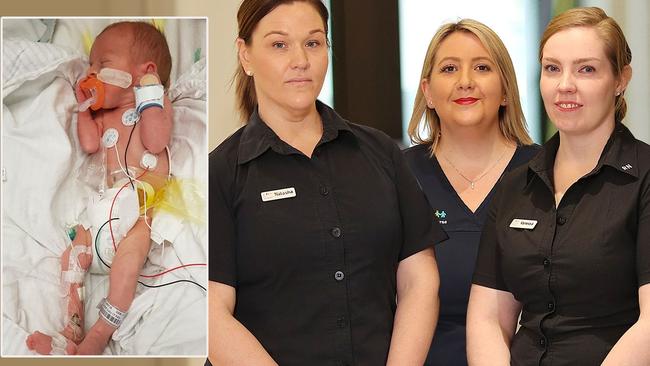
“They’re precious little bubbies. You still talk to them and still rock them,” she said, her voice trailing off as it cracked with emotion.
“It’s heart wrenching, surreal, devastating, and we’re devastated for the mum and dad and watching their pain.
“But, you don’t cry at work. Well, I might have a little tear, but then you pull yourself together. It’s at home that I have a massive big cry.”
Mum to 10-year-old Evie Wright, Natasha says she remembers every single child that has passed away in the hospital during one of her shifts.
“I know the room, the time and, particularly on night duty, if one of those rooms is empty, I can’t walk into it,” she says.
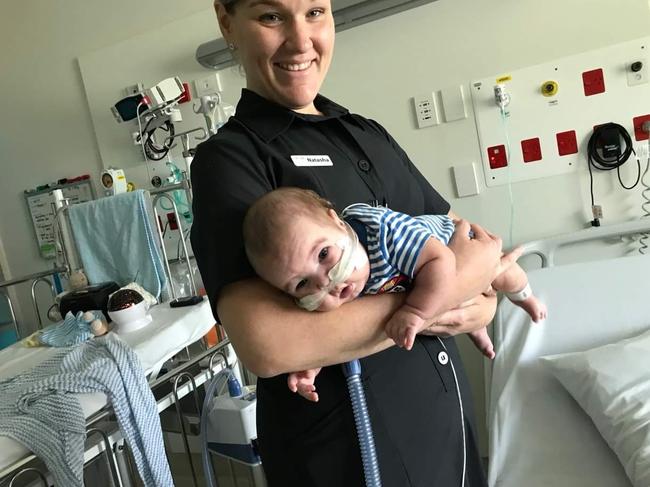
Despite the emotional days, Natasha says she would not have it any other way, describing her job as an “honour and a privilege,” a sentiment echoed by many of her colleagues.
At the start of her next 12-hour shift, Natasha and up to nine other paediatric nurses huddle around the nurses station.
They’re in Ward 9B, the state’s only specialist ward for babies 12 months and under.
The station – which doubles as a reception desk – sits in the middle of the ward, which caters for up to 24 babies.
A room at each end of the hallway has three cots and parent beds, while the remaining rooms are single, used for either infectious patients or for those in need of isolation or privacy.
A note board on one wall is chock full of thank you notes from parents to various nurses: Sindhu, Helen, Cherry, Jessie, Allanah and numerous others.
The shift briefing informs the nurses of each baby’s condition and needs, including their medication and feeding schedules.
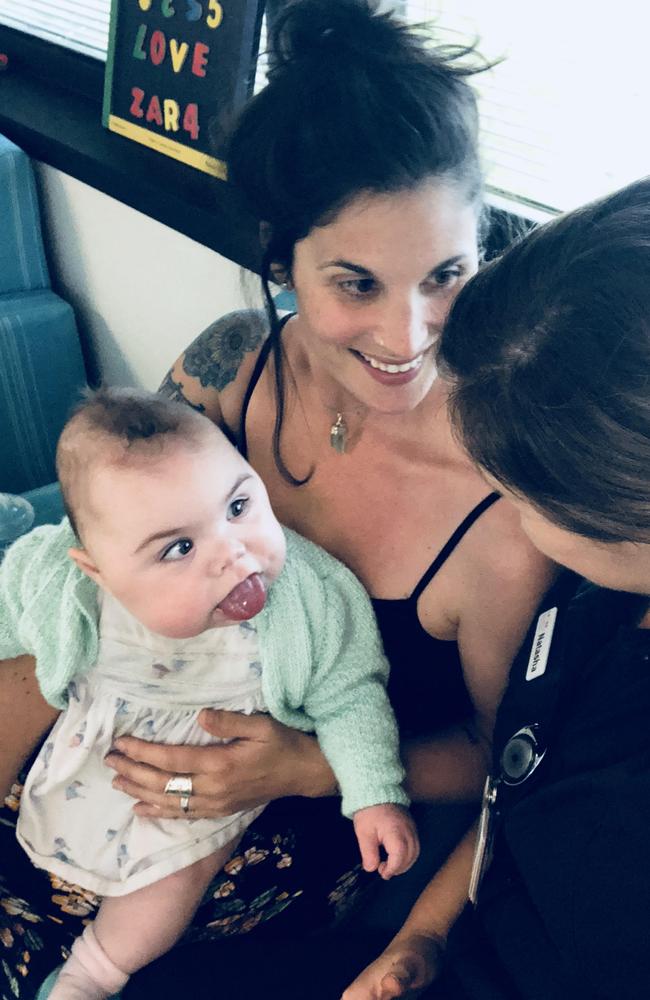
They then spread out to check on their three allocated tiny patients, introducing themselves to the parents and asking if they need anything.
Though Ward 9B is full of children with differing levels of illness or trauma, the hallways are full of empathy.
On any given day, there might be a newborn with liver problems, or a 10-month-old with a broken bone or a urinary tract infection.
Many babies only need to stay in hospital a few days, but others can stay for months, with some having been sent from local hospitals or from the Paediatric Intensive Care Unit.
There might be someone like Landon Loughran, born with haemophilia, who was transferred from the Ipswich hospital at five days old after a bleed was found on his brain.
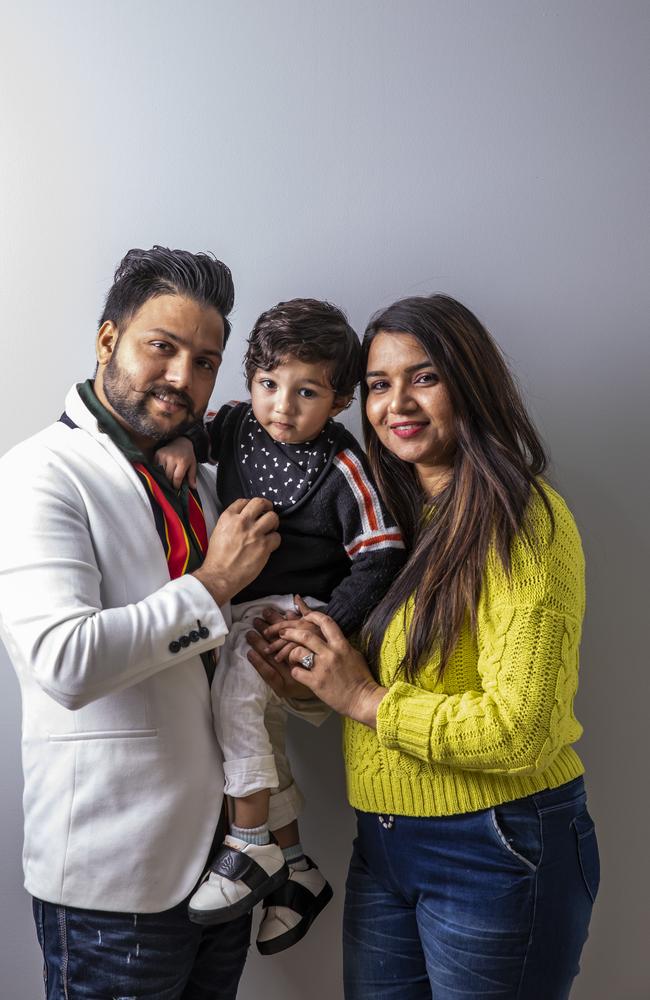
Or there might be some who need multiple operations – like Oliver Glover, diagnosed with Short Gut syndrome or tiny Agamveer Singh, born with long gap oesophagus atresia with tracheoesophageal fistula – who needed critical medical care from birth.
Oliver underwent surgery at two hours old to try to fix his small intestine, which had not formed properly.
He spent his first two months at the Neonatal Intensive Care Unit (NICU) at the Mater Hospital, before being transferred to Ward 9B at QCH.
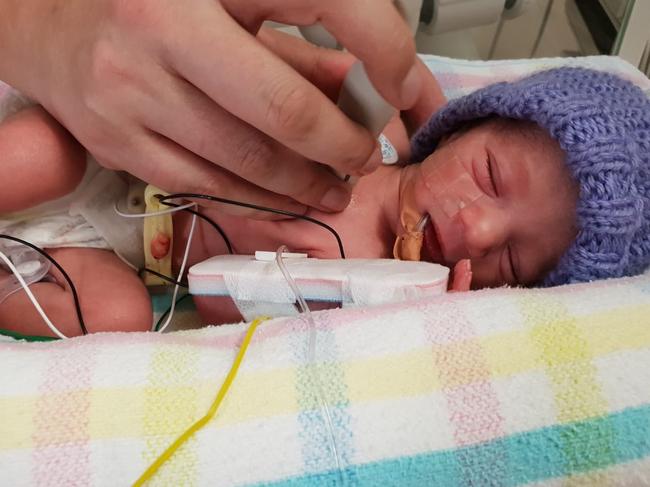
Agamveer, born with no anal hole and his oesophagus rolled into his stomach, also spent the first 10 weeks of his life in the Mater’s NICU before being moved to QCH, where he underwent several more operations over the following five months.
Then there are the babies like 5-month-old Archie du Preez, born with incurable Interstitial lung disease and Neonatal chronic lung disease, who never got to go home for good.
Sometimes, it’s the parents that need the most support.
The nurses are also on-the-spot grief counsellors, teachers, advocates and child minders.
Many of the babies are diagnosed with chronic illnesses or “life-limiting” conditions right there in the ward, says registered nurse Vanessa Dwyer, of Keperra.
“They come to get their first diagnosis and the real grief happens right there,” she said.
“You think you’re going to have this perfectly normal baby, and it’s not what happens sometimes.”
Vanessa, 30, says most parents arrive anxious and terrified.
“You see them through the five stages of grief really. You have to be their comfort and settle them in, especially if they’re long termers,” she said.
“You have to be their teacher and their advocate, to help guide them on this journey, especially if they have a child that’s going to have lifelong disabilities or issues.
“In some cases, they may not be angry at us, but we’re the ones who cop it. Family and friends will come in for visits, but it’s really the bedside nurses that are there for the 12-hour shifts that cop the emotions.”
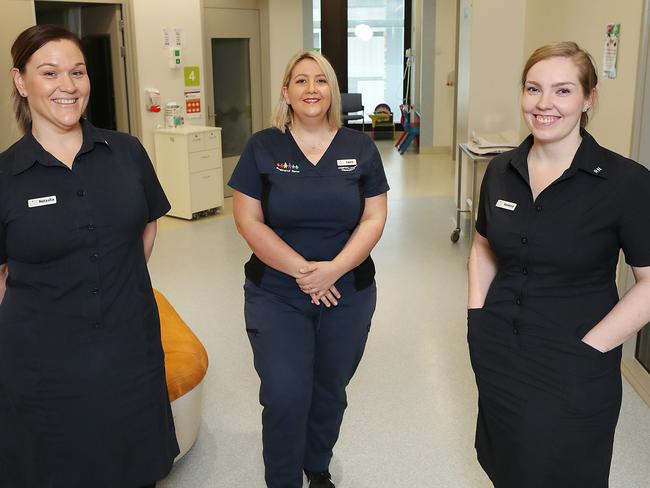
PERSPECTIVE IS EVERYTHING
The nurses are discreet, not sharing information about one patient with the next, though at times that can prove challenging within itself.
“In one shift I was dealing with an imminently dying child, while in the next room the parents were whinging because their bottle or Panadol was late,” says Natasha.
“They had no idea what was happening in the next room and you can’t say anything.
“We might have (emergency) code bells going off and we have to actively resuscitate a child, but even a parent in that same room, who can see the commotion, will sometimes be complaining because something is late.”
A doctor enters one of the shared rooms with test results and delivers the news that their four-month-old has a brain tumour.
Moments later, the same doctor informs the family next to them that their also four-month-old son has been diagnosed with a spinal tumour.
“A newly diagnosed tumour can be devastating,” Nurse Vanessa says.
“You can hold it together, comfort the parents and be the strongest person in the world, but then get to your car after your shift and crumble.
“You wish you had windshield wipers on your eyeballs.”
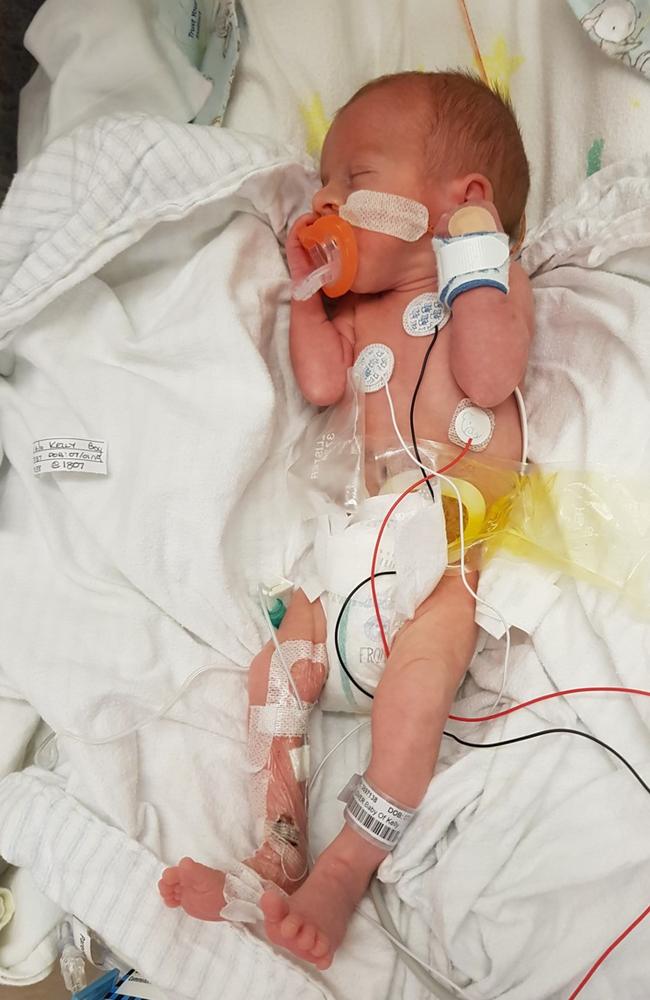
For those lucky enough to be taking their baby home, the nurses teach the parents how to care for their child’s needs once they leave the hospital, such as how to feed their babies or give medication down tubes.
They arrange for support services – anyone from a social worker to a chaplain to an occupational therapist – to visit the families while they’re in the hospital.
The babies ward is a unique one as it caters for every type of ailment except for cardiac patients, Vanessa explains, and is one of the busiest outside of the emergency and intensive care departments.
“In most hospitals, you’re usually split by what condition you have, like all the respiratory patients might be together and all the cardiac patients are all together,” she said.
“It’s tough. The trauma and the horror of the things you see … the general public would be absolutely mortified.”
IT’S THE LITTLE THINGS
IT’S close to Easter and nurse Laura Ursell is on nightshift, armed with art supplies.
She paints little feet and presses them onto paper, making footprint cards for Easter or birthdays.
“I go into work for a 12 hour shift, but I get to walk out of those doors, whereas some of those families can’t leave, or don’t leave, for months,” she said.
“If I can bring a little bit of normality to a situation, then why not.”
Laura, 36, said the nurses also try to help parents who have to tag-team staying at the hospital with caring for other children by looking after the baby for a night, while the family gets some time together outside of the hospital.
She said the 4-year-old brother of an 8-month-old girl who needed a liver transplant was often invited to sit at the nurses station.
“He’d come and sit and do colouring at the nurses station, so we entertained him for a little bit,” she said.
That little boy eventually made Laura a card in the shape of a heart, which is now proudly displayed on the fridge in her Kangaroo Point home.
Many of the nurses try to provide some extra kindness to families with ill children.
Vanessa, who likes to sew and work with vinyl transfers, was on a shift the day before baby Archie got his first and only visit home – thanks to the hospital’s Palliative care team who organised the baby’s only day out of the hospital – before he passed away.
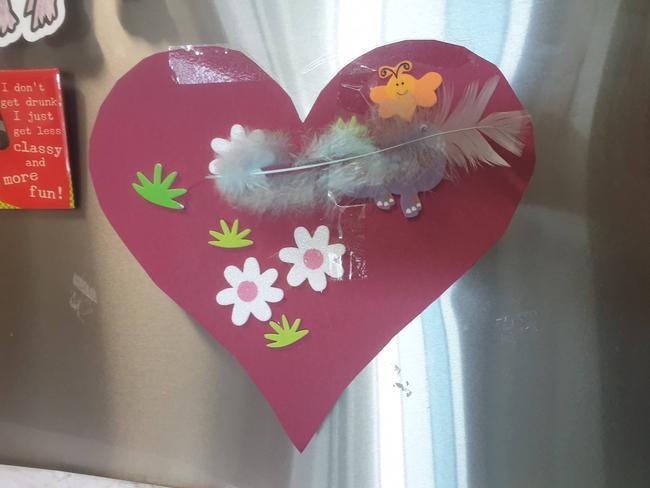
Mum Jenna had happened to mention that she wished she had time to have a special onesie made for Archie and his twin brother, Henry.
Without telling Jenna, Vanessa made two onesies that very night after work, emblazoned with “Archie’s great adventure” and brought them in the next morning, prior to the big day out.
“She cried, and I cried,” Vanessa recalls.
Asking around the ward, the nurses say the same thing.
Even though some days are hard, they love their job and making a difference in people’s lives.
The teamwork component is huge, not just between the nurses, but between everyone from the ward’s administration officer to the catering staff, the “wardies” and between other hospital units.
“I work with the most kick-arse women and men,” Natasha says.
“They are absolutely incredible.”

